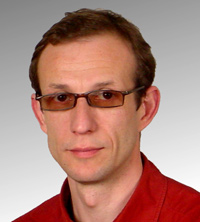
Nume: TROC Gabriel
Tema: Migraţie, Identitate şi Cetăţenie
Partener: Institutul pentru Studierea Problemelor Minorităţilor Naţionale, Cluj Napoca
Proiect: Status, Social Change and Development in Two Migrants Communities from Romania
Date de contact
gabrieltroc@yahoo.com
Profil
Gabriel Troc teaches social anthropology at the Faculty of Sociology and Social Work, at Babeş-Bolyai University in Cluj, Romania. He did fieldwork researches on different Roma communities from Transylvania and on workers’ districts in Cluj. He was the recipient of a Fulbright grant at UCLA in 2007-2008, and of two Tempus scholarships, at Sussex University in 1998 and at Utrecht University in 1999. His academic interests are focused on social stratification after 1989, marginal ethnic groups, urban development in post-socialism and migration.
Status, Social Change and Development in Two Migrants Communities from Romania
Whoever travels nowadays through the Romanian countryside notices here and there villages that stand out due to their large houses, colored walls and fences, and infrastructure improvements. Many of these villages have been developed in the last two decades by rural migrants in different European countries, who have chosen to invest an important part of their financial gains in their households’ enhancement. The social studies on migration see this phenomenon (which is not specific only to Romania) mostly as a phase in the use of the financial remittances (Massey), or as a sign of a change in the consumption patterns - both features being common to any population in the context of transnational migration. While things may be so described from a macro perspective, a micro analysis would provide us with a different picture: it would give account for a phenomenon which, in the case of some groups that practice circular migration, took the form of what Marcel Mauss called a total social phenomenon. Namely, the analysis might unravel a situation in which entire communities are involved in an intense competition for expressing, via material possessions, a new position as a result of working abroad. Very often, the large houses represent only the visible part of a whole repertoire for producing distinctions, which involves anything from possessing prestigious traditional items to possessing luxury cars, expensive furniture or high-tech gadgets. This internal competition which is powered mostly by financial remittances of the migrants, has led to a particular form of development: not one that is produced “upside-down”, through strategies that are planned and implemented by bureaucracies and administrations, but “bottom-up”, having as the main engine the competition between individuals for getting status and prestige, in the condition of the access to significant financial resources in a short period of time. While this development is not properly a modern one, it involves mostly modern means, which raises a number of questions regarding its viability and its potential to be transformed in a long-time development that would be beneficial for these villages in the long run.
Drawing on these assumptions I propose a comparative research of two Romanian villages, which belong to two different historical provinces, but have in common a recent history of mass migration and a similar path of development: Certeze, from north-western Romania (Satu Mare County), with a population of 3300 inhabitants and Suhaia, from southern Romania (Teleorman County), with a population of 4800 inhabitants.
The main aims of the research are to understand the social forces that stand behind the local competition for acquiring prestige, to give a precise account of the repertoire for getting social distinction, to understand the acculturation these communities are going through, as a result of migration, and to describe the social change that comes with it, and to clarify the features of this sort of development, as well as its chances to be stabilized as a durable development.
Main works:
- (book; author) Gabriel Troc, Postmodernismul în antropologia culturală, Polirom, Iaşi, 2006
- (book; editor) Magyari-Vincze; Colin Quigley, Gabriel Troc, Întâlniri multiple. Antropologi occidentali în Europa de Est, Editura Fundaţiei pentru Studii Europene , Cluj, 2000
- (article) Gabriel Troc, “The Roma in Post-Socialist Eastern Europe: Marginalization and Resistance” , in Journal of the Department of English, Vidyasagar University, no. 1/2008, Medinipur, West Bengal
- (article) Gabriel Troc, “Postmodernismul în antropologie” , in NOEMA, vol. IV, no. 1/ 2005, Academia Română, Bucureşti
- (article) Gabriel Troc “A State of Despair: Roma (Gypsy) Population during Transition. Transylvanian Case Studies” , in Studia Europaea, XLVII, no. 1-2/ 2002, Cluj